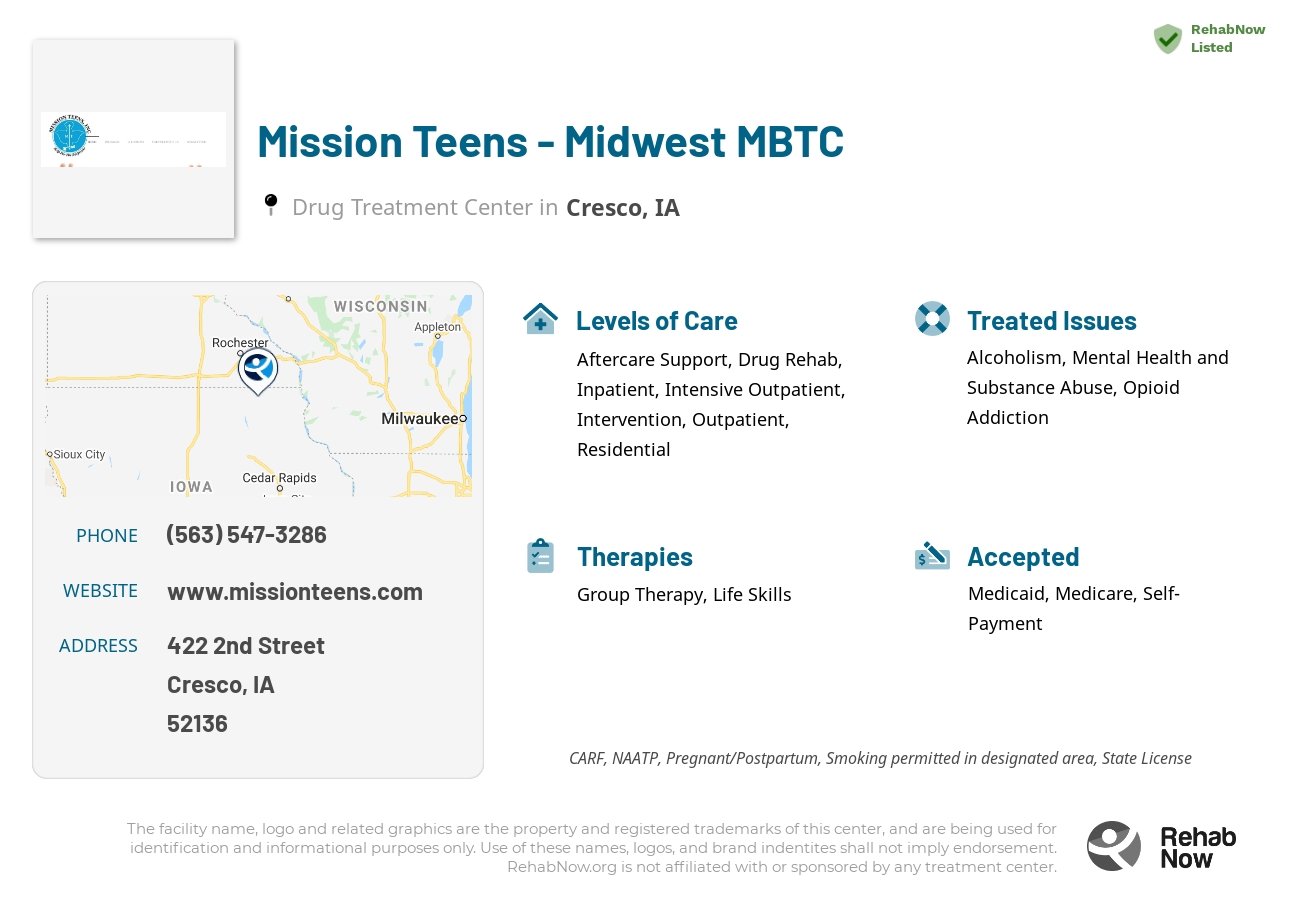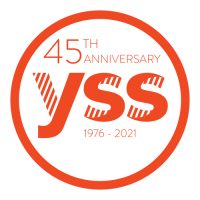Mission Teens - Midwest MBTC
Drug Rehab Center in Cresco, Iowa
Mission Teens - Midwest MBTC provides quality care for teens coping with mental health, substance abuse, and related behavioral issues through individualized care and recovery services tailored to each teen's needs and goals, including holistic, faith-based treatment options, and innovative, evidence-based treatment modalities.
About Mission Teens - Midwest MBTC in Iowa
Mission Teens - Midwest MBTC in Cresco, Iowa, is a not-for-profit organization dedicated to providing quality care for teens coping with mental health, substance abuse, and related behavioral issues. The organization offers an expert team of clinicians, nurses, therapists, case managers, and other specialists who provide individualized care and recovery services tailored to each teen’s needs and goals. Mission Teens helps teens cope with substance abuse and addiction by providing addiction assessments, individual and group therapy, medical and psychiatric care, family therapy, and social and recreational activities. The organization also offers holistic, faith-based treatment options, such as yoga, meditation, and spiritual retreats.
Mission Teens - Midwest MBTC is staffed by a highly trained and certified team of professionals to ensure the highest quality of care. They provide comprehensive substance abuse treatment, specializing in trauma-informed care. This includes individual and group counseling, life skills and relapse prevention training, and substance abuse education. Their group therapy sessions are offered in a supportive and non-judgemental environment to foster a sense of trust and security for teens learning to cope with addiction.
Mission Teens is accredited by the Joint Commission, and is licensed by the Iowa Department of Human Services and the National Association of Addiction Treatment Providers. They have also earned three distinct awards: The 2016 Iowa Healthiest State Initiative Recognition, Recognition for Excellence in Behavioral Health Services, and the Health Care Merit Award. The staff of Mission Teens specializes in innovative, evidence-based treatment modalities that uniquely combine traditional addiction treatment approaches with alternative methods. These include experiential therapies, adventure-based activities, recreation, and expressive therapies. The goal of each program is to offer teens the skills and motivation to achieve lasting sobriety.
Genders
Ages
Modality
Additional
Conditions and Issues Treated
Opioid addiction treatment should be done in a medically supervised drug rehab. While taking opioids, users will typically use other substances to enhance the effects of opioids or to reduce the adverse effects of opioid use. Opioid addiction treatment will include detoxification and drug rehab counseling to help both the user and their loved ones learn how to live a successful sober lifestyle.
Treatments such as methadone, buprenorphine, and naltrexone are three medications that can help treat opioid addiction. These drugs work on the brain’s pleasure center and reduce cravings and the effects of illicit opioids such as heroin. These drugs can be either given orally or by injection. Individual drug rehab counseling sessions can be helpful to discuss any questions or concerns with the drug treatment program. This counseling will also help the user set goals for when they finish drug rehab.
Opioid addiction recovery is a long process. Many of the changes to the brain caused by opioid use cannot be undone, but with time and the proper treatment, a person can return to normal function. After detox, treatment will include drug rehab counseling and entering a halfway house or sober living community. Aftercare is critical to long-term recovery, as it helps the user avoid relapsing and entering back into drug rehab.
Levels of Care Offered
This center offers a variety of custom treatment tailored to individual recovery. Currently available are Aftercare Support, Drug Rehab, Inpatient, Intensive Outpatient, Intervention, Outpatient, Residential, with additional therapies available as listed below.
Inpatient treatment for alcoholism or drug addiction is an option that provides the addict with a supportive environment in which they can stop using. This type of treatment is appropriate for addicts that are most in need of intensive care and supervision. This includes those who were unable to quit on their own, those who need more structure than they can get in outpatient treatment.
Intensive outpatient treatment is a type of comprehensive addiction care. Unlike conventional residential treatment programs, the patients live at home during the recovery process. This means that one can continue working and caring for their families. These also allow people to keep pursuing their studies while also working on their sobriety.
Outpatient treatment can help one transition to normal life from the round-the-clock supervision and treatment available during inpatient treatment. It is an excellent tool to ensure long-term recovery. However, it is essential to note that intensive outpatient treatment in itself does not remove patients from the real-world setting. This means there’s always a higher risk of coming across environmental triggers. To further prevent relapse, an outpatient treatment center should be able to provide ongoing support services.
Once the patient is enrolled in an intensive outpatient treatment program, they will be expected to attend therapy and group meetings daily for a stipulated period. The frequency and duration of each session will depend on the patient’s needs and level of addiction. This can help curb the habit and deal with underlying issues that led to it. Most of these professional treatments are designed to allow patients to structure their daily schedules in a way that is conducive to recovery.
“Outpatient treatment is ideal for those who have a lower intensity addiction. It’s also suitable for those with a supportive environment and those on a tight budget.
Outpatient treatment can be considered the lowest intensity level of addiction treatment. It is ideal for early phase addiction or lower intensity addictions. It may involve weekly sessions instead of daily. Peer group support, 12-step programs, and individual counseling may still be used and anti-addiction medication.
Residential treatment programs are those that offer housing and meals in addition to substance abuse treatment. Rehab facilities that offer residential treatment allow patients to focus solely on recovery, in an environment totally separate from their lives. Some rehab centers specialize in short-term residential treatment (a few days to a week or two), while others solely provide treatment on a long-term basis (several weeks to months). Some offer both, and tailor treatment to the patient’s individual requirements.
Drug rehab intervention aims to make sure patients understand the risks of their addiction and possible outcomes. They must learn how their addiction affects those around them and allow a therapy session to help move past the physical symptoms. They often include psychotherapy or behavioral therapy, group therapy, family counseling, and peer support.
Aftercare support is vital to those who have completed a drug or alcohol treatment program. This support comes in individual and family counseling, treatment of psychiatric and other medical conditions, and medications to reduce cravings. It helps recovering addicts adjust to normal day-to-day activities and can last for a year or longer.
The majority of drug and alcohol addicts who receive aftercare treatment do not relapse. It is estimated that without aftercare, the relapse rate will be between 70 to 90 percent for most people. Aftercare is the final stage in addiction recovery, but it will also help maintain sobriety if relapse does occur.
Therapies & Programs
Group therapy is held in a safe, controlled setting where patients can feel comfortable sharing their struggles and gaining perspective through shared conversations. It takes place in a group rather than one on one to prevent feelings of isolation or being unique in their situation while creating an environment for addicts at Mission Teens - Midwest MBTC to develop fellowship, accountability, and support. Group therapy is an important tool in recovery that prevents cravings that prompt a return to active addiction.
Life skills training is beneficial for addicts in recovery because it helps them learn how to take care of themselves and improve their quality of life, which can promote feelings of purpose and motivation.
This type of treatment works by teaching individuals life-enhancing skills that support positive living, including:
- Healthy lifestyle habits
- Skills to effectively manage stress
- Effective communication skills to help them get their needs met without turning to drugs or alcohol
- Money management and budgeting skills so they can continue to take care of themselves after treatment ends.
Payment Options Accepted
For specific insurance or payment methods please contact us.
Additional Details
Specifics, location, and helpful extra information.
Cresco, Iowa 52136 Phone Number(563) 547-3286 Meta DetailsUpdated November 25, 2023
Staff Verified
Mission Teens - Midwest MBTC Patient Reviews
There are no reviews yet. Be the first one to write one.
Cresco, Iowa Addiction Information
Iowa ranks 2nd lowest in the nation for illicit drug use, but 12% of its residents are still using these drugs every single year. Methamphetamines account for more than 90% of all drug-related prison admissions in Iowa. Alcohol is the most widely abused substance in the state, with 23% of residents admitting to heavy drinking.
Treatment in Nearby Cities
- Humboldt, IA (115.0 mi.)
- Sioux Center, IA (205.4 mi.)
- Sioux City, IA (225.2 mi.)
- Denison, IA (189.1 mi.)
- Harlan, IA (202.0 mi.)
Centers near Mission Teens - Midwest MBTC
The facility name, logo and brand are the property and registered trademarks of Mission Teens - Midwest MBTC, and are being used for identification and informational purposes only. Use of these names, logos and brands shall not imply endorsement. RehabNow.org is not affiliated with or sponsored by Mission Teens - Midwest MBTC.



